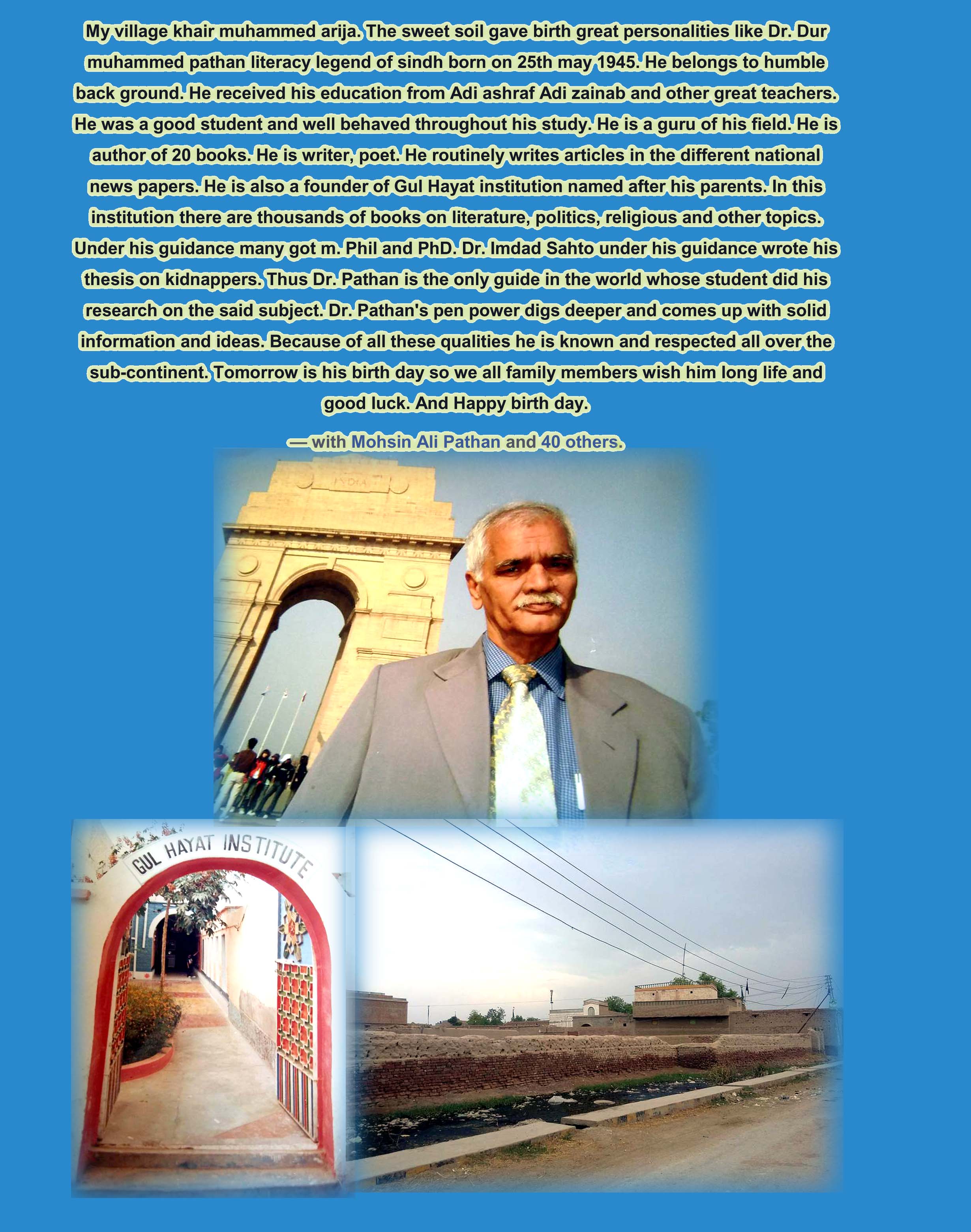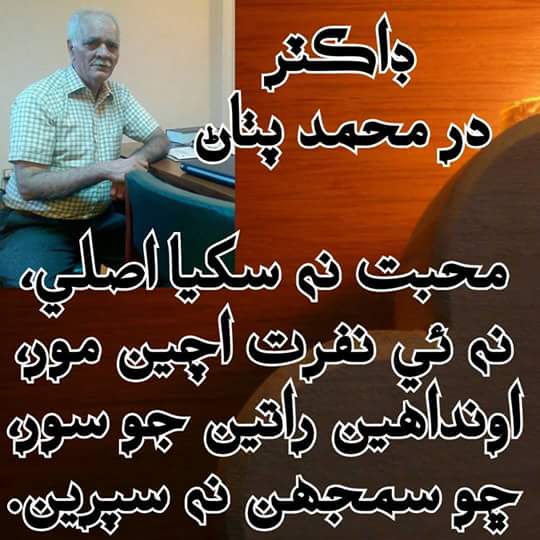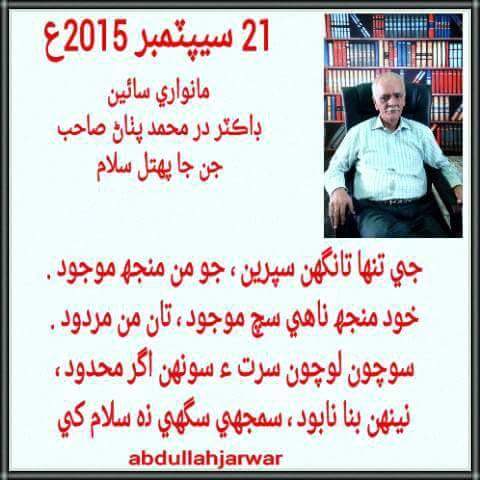ممتاز پٺاڻ
(گل حيات جي ميڙي چونڊيءَ مان)
” ھندو سنڌ کي ممبئيءَ کان الڳ ڇو نہ پيا ڪرائن“

“ھندو سنڌ کي ممبئيءَ کان الڳ ڇو نہ پيا ڪرائن" بابا سائينءَ گل حيات ۾ ٽالپورن, انگريزن ۽ موجودھہ دور بابت ايترو تہ گهڻو ۽ ناياب مواد گڏ ڪيو آھي, جو ٻن سالن کان روزانو لکندي, ان بابت پورو تفصيل بہ ٻڌائي نہ سگهيو آھيان. آئون اهو بہ شدت سان محسوس ڪريان ٿو تہ فيس بوڪ ۽ انٽرنيٽ گروپن تي دوست ٻيون گهڻيون سرگرميون ڪن ٿا, پر سنڌ جي تاريخ کي گهربل دلچسپيءَ سان نہ ٿا پڙھن. ڪيترن لاءِ تاريخ جو مطالعو "قبرن کوٽڻ" وارو ڪم آھي. جڏهن تہ جيڪي قومون تاريخ کان منھن موڙينديون آھن, انهن کان مسئلن جي حل وارا دڳ ۽ پيچرا منھن موڙي ويندا آھن, جيئن اسان کان منھن موڙي ويا آھن. منھنجون پوسٽون ڪو پڙهي نہ پڙھي, پر ان مان منھنجو هي مقصد پورو ٿئي ٿو تہ مان پڙھندڙن کي ٻڌائي سگهندو آهيان تہ منهنجي والدصاحب سنڌ ۽ سنڌ جي تاريخ جي ڪيتري ۽ ڪهڙي خدمت ڪئي آھي. مان اچان پنھنجيءَ ڳالھہ تي تہ سنڌ جا هندو ڪهڙن سببن ڪري سنڌ کي ممبئيءَ کان الڳ ڪرڻ کان نابري واري ويٺا ۽ اهي ڪهڙا سبب هئا, جو سنڌ کي صوبائي حيثيت ۾ ڏسڻ ۾ ارها هئا. هن مسئلي تي گل حيات ۾ تمام گهڻو مواد موجود آھي. اهو هن ڪري اهم ۽ ناياب آھي, جو هندن مان اڪثريت لڏي وئي ۽ سنڌ ۾ ڪنهن محقق هندن جي مؤقف تي غير جانبداري سان ڪونہ لکيو آھي. انھيءَ سلسلي ۾ مون بابا سائينءَ جي نوٽس جا فائيل ڇنڊيندي انھيءَ موضوع تي هڪ فائيل نظر مان گذريو. انھيءَ جي آڌار تي هيءَ پوسٽ لکي رهيو آهيان. سنڌ کي ممبئيءَ کان الڳ ڪرڻ جو مطالبو سڀ کان پهريون هندو سياستدان سيٺ هرچندراءِ وشنداس ڪيو هو. پوءِ باقي هندن جي خيال ڏسي مخالف ٿي بيٺو. سنڌ جي هندن 1930 کان بہ گهڻو اڳ سنڌ جي جدائيءَ جي مخالفت شروع ڪئي هئي. بابا سائينءَ طرفان هن موضوع تي گڏ ڪيل ڊاڪيومينٽس مان هڪ انگريزيءَ واري ڊاڪٽيومنٽ ۾ لکيل آھي تہ :
In July 1931 we (Hindus) considered it necessary to wait in deputation on His Excellency the Viceroy at Simla to represent our case and invited His Excellency's kind attention to the position which we along with other non-moslem communities occupy in the economic, political and social life of Sind. If the British can claim with pride their achievement in evolving order out of the chaos and anarchy that prevailed on after the British conquest of Sind, we the Hindus of Sind can claim to have given them their fullest co-operation in this task ; we supplied for generations the bulk of administrative staff and professional talent; we have been the pioneers in the field of education, social reform and local self-government; we sowed the seeds of public life in Sind; we not only stimulated its internal trade but went abroad to bring to it wealth from foreign lands; we built up the indigenous banking system of the country and connected it with the trading centres or India, and the world outside ; and as can be seen from the settlement reports we supply the most progressive and enterprising. element even among the Zamindari class. But our very existence depends on economic and political security, freedom of enterprise in trade, industry and agriculture, and absence of crushing taxation. Anything that is likely to affect this essential basis of modern civilisation is a matter of life and death to us. We own twenty seven per cent of land, and as owners and lessees we already pay forty per cent of the land revenue; the bulk of the Excise revenue, Stamps Registration, Income-tax and Customs in Sind falls likewise on our shoulders. Any increase of taxation will hit us hard specially in these days of severe depression ; any reduction of expenditure on Police or Justice will force us to leave the mofussil ; any lowering of educational efficiency will ruin our future. We are thus vitally interested in the question of separation of Sind from the Bombay Presidency, for we have great stakes in Sind; and we claim that as a minority of twenty six per cent we have contributed much m'ore than their proportionate share towards the moral and material development of Sind, and towards the administrative expenditure on provincial and central governments. All we demanded was fair play and a full hearing before a just and impartial tribunal. which will deal with this question absolutely on its merits. irrespective of communal bargaining. Our interests in Sind are large, and it will be perfectly legitimate for us to safeguard our position and economic interests which we have built up after generations of effort, particularly in view of the recent communal tension and the treatment accorded to us by the majority during the recent widespread communal dacoities, arson and murders in the districts of Sukkur, Larkana and Upper Sind. But our opposition was based on ground much wider than selfish considerations, for we were convinced and were ready to prove it before any impartial tribunal, that the separation of Sind would prove ruinous to Sind as a whole. His Excellency the Viceroy was pleased to give us a patient hearing and said at the end that he fully realised the desirability of giving a hearing to the Sind Hindus on the whole case and not merely on the financial side of it, before a final decision was taken regarding the separation of Sind and would represent this aspect of the case to His Majesty's Government. سنڌ جي هندن سرڪار طرفان پاڻ کي نظرانداز ڪرڻ جا ڏاڍا سور سليا. انھيءَ سلسلي ۾ گل حيات ۾ موجود هڪ ڊاڪيومينٽ مان اقتباس ڏيان تو: The Government of India appointed an expert Financial Enquiry Committee from which a deliberate attempt was made to exclude every Sindhi or for the matter of that every expert from Bombay for reasons which are best known to the Government of India and His Majesty's Government. It is significant to note in this connection that the constitution of the Orissa Committee was materially different and that the non-official representatives of Orissa fully participated in the deliberations of their Committee either as full members or as co-opted members of the Committee. It is significant also to note, that although originally it was intended that a former Accountant General of Bombay would carry on the expert examination of the financial implications of separating Sind from Bombay, an official from the Punjab, known for his pro Muslim tendencies, was eventually appointed as Chairman of the Sind Financial Enquiry Committee. The Expert Com mittee's investigation showed that on the day of separation Sind will have to face an initial deficit of 110·42 lakhs a year which, unless the Lloyd Barrage came to the rescue, would grow to 144· 19 lakhs in 1962-63 (vide para 84 of their report). They further pointed out that even if the full rates of assessment proposed for the barrage area were realised, "a very rash assumption in the existing circumstances, Sind will always be a deficit Province on our basis of calculation, although the deficit will fall to below half a crore of rupees after 14 years and below a quarter of a crore after 18 years. If only the slump rates are imposed the deficit will never be less than a Crore of Rupees. At the average of the two rates, the deficit will not fall below a crore of rupees until the 14th year after separation, the ultimate deficit on the full development of the Lloyd Barrage being 63·7 l lakhs". (Vide para 83 of the Report).
هن موضوع تي کوڙ سارو مواد گل حيات ۾ موجود آھي ۽ آئون ڪوشش ڪري, ان مان بہ ڪجھہ نہ ڪجھہ هتي دوستن سان شيئر ڪندو رهندس.



